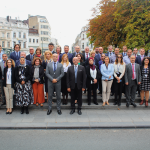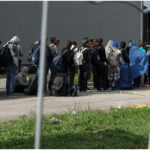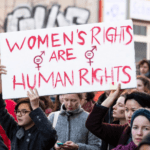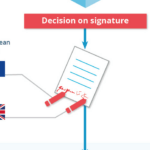On 10 February, Dubravka Šuica , European Commissioner for the Mediterranean, was in Madrid for the first time during this mandate to take part in a series of high-level meetings with Spanish national authorities in order to step up cooperation on key issues for the Mediterranean region. The Commissioner was received in audience by King Felipe VI and met with the Minister for Foreign Affairs, EU and Cooperation, Mr José Manuel Albares, and the Minister for Inclusion, Social Security and Migration, Ms Elma Saiz Delgado. The Commissioner and Minister Albares also held a meeting with the Secretary General of the Union for the Mediterranean, Mr Nasser Kamel.
The Commissioner highlighted key strategic priorities, including preparations for the New Pact for the Mediterranean to foster a more integrated approach to bilateral and regional cooperation, relations with North Africa and Gulf partners, the current situation in the Middle East, including reconstruction needs, and the role of the Union for the Mediterranean. The visit was timely as this year marks the 30th anniversary of the Barcelona Process with a ministerial meeting planned for November, which will be a crucial occasion to revitalise regional cooperation in the Mediterranean .
- The Commissioner highlighted the importance of Spain’s role as a bridge between Europe and the Mediterranean and underlined its strong ties with North African partners in areas such as migration, economy and energy.
- He also expressed his determination to maintain close contacts to make the New Pact for the Mediterranean a success and to work on integrating Spain’s contribution to the Pact. He discussed future investments, specifically in energy and clinical technology, as well as cooperation in migration management.
- He reaffirmed the EU’s commitment to supporting stability and development in the Middle East . Plans are being made for the 9th Brussels Conference on Syria , including future financial assistance for early recovery and reconstruction.
- Both sides discussed ongoing assistance to the Palestinian Authority and preparations for the reconstruction of Gaza when conditions permit, as well as their determination to promote a two-state solution as a way forward toward a more sustainable relationship between Israel and Palestine.
- They noted the strategic importance of enhanced cooperation between the EU and the Gulf region, with plans to foster partnership agreements with all six Gulf Cooperation Council (GCC) countries .
- They discussed ways to enhance regional cooperation, in particular by revitalising the Union for the Mediterranean, the only regional organisation bringing together the EU and its partners on the southern shore of the sea.
- They discussed strengthening cooperation on migration management with Mediterranean partners, an issue in which Spain is a crucial partner . Legal avenues and the reduction of irregular migration through a greater fight against migrant smuggling are fundamental pillars of global cooperation on migration.
- Bilateral strategic and comprehensive partnerships under the New Pact promote people-to-people contacts that help build bridges. Legal pathways and skills development are essential for both economic competitiveness and social cohesion. In this regard, the EU has launched talent partnerships with Morocco, Tunisia and Egypt that help strengthen labour migration capacities and foster skills development.
This visit to Spain is part of the consultation process led by Commissioner Šuica on the formulation of the new EU policy towards the Mediterranean and Gulf countries, with a view to incorporating and reflecting the positions of EU Member States and our partners. The Commissioner has reaffirmed her commitment to working closely with Spain and other partners to ensure the long-term stability and prosperity of the region.
Dubravka Šuica, Commissioner for the Mediterranean, said:
«Spain has always played a key role in the Mediterranean and I will work with its Government and all stakeholders to ensure that our initiatives bring real and lasting benefits to the entire region.
The New Pact for the Mediterranean aims to agree on a common vision for the region, with a focus on trade and investment, energy and clean technologies, climate change adaptation, digital and transport connectivity, security, people-to-people relations and migration management. In the coming months, I will continue to consult with governments, the private sector and civil society to formulate policies that promote prosperity, stability and security. I will also strive to revitalise regional cooperation within the framework of the Barcelona Process and, in particular, the role of the Union for the Mediterranean.
The Mediterranean is more than just a region, it is also a vital cultural and commercial bridge linking three continents. Although the region faces significant challenges, such as geopolitical tensions, economic disparities, climate change and migration pressures, I firmly believe that by working together we can turn these challenges into opportunities. Investing in economic development, education and job creation will bring prosperity and stability to both sides of the Mediterranean.
Europe cannot act alone. The Mediterranean and the Gulf are deeply interconnected, and closer cooperation between the EU and the Gulf will be essential to address both global and regional challenges. This year, as we celebrate the 30th anniversary of the Barcelona Process, we must seize the opportunity to intensify and revitalise our cooperation.”
More information European Commission.







Leave a Reply